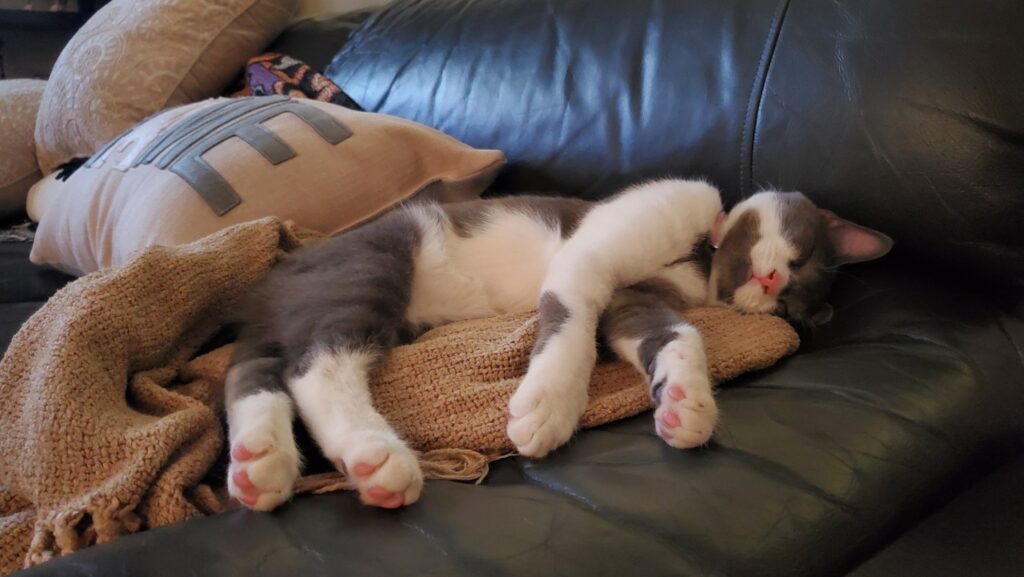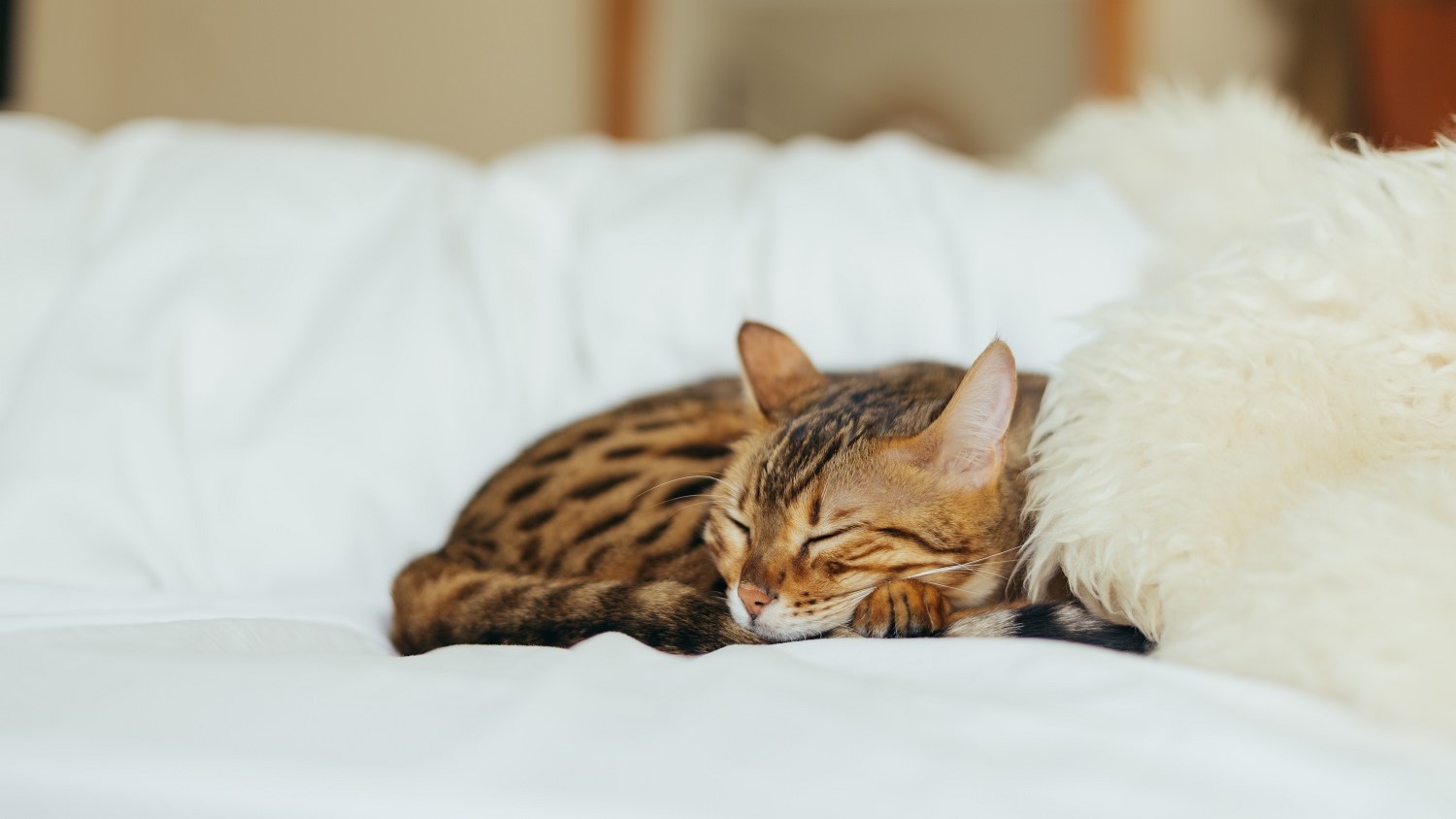You finally get your tiny new roommate settled in, and now it is time to get some sleep. But as you climb into bed, the thought creeps in: Is it okay to leave my kitten alone while I sleep?
Yes, it is. Leaving your kitten alone at night is not only fine, it is a normal part of helping them adjust to their new home. The key is to make sure their environment is safe, secure, and comfortable while you are catching some much-needed rest.
Kittens may be small, but they are resilient. With the right setup and routine, they will do just fine overnight—even if they do spend part of it plotting how to knock over your houseplants.
Why Kittens May Struggle at Night
Kittens are naturally active during twilight and early morning hours. This behavior, known as being crepuscular, means they are more likely to explore, play, or cry out during the times you’re trying to sleep.
Add to that the fact that your kitten may still be adjusting to life without their mother and littermates, and nighttime can feel a little lonely or overwhelming. Meowing, pacing, or even scratching at doors is usually not a sign of distress—it is just your kitten figuring things out.
The good news is, with a little support and structure, they can learn to settle into a nighttime routine.
When It Is Safe to Leave a Kitten Alone at Night
Most kittens can be safely left alone while you sleep by the time they are 8 to 12 weeks old, as long as their needs are met before bedtime. This includes:
- A full belly
- A clean litter box
- A safe space to rest
- Access to water
- A quick play session to burn off energy
Younger kittens, especially under 8 weeks, require round-the-clock feeding and care, and should never be left alone overnight. But if your kitten is eating solid food and using the litter box reliably, they are ready for solo nights.
How to Prepare Your Kitten for a Peaceful Night
A little preparation goes a long way when it comes to setting your kitten up for a safe, quiet night. Here’s how to make bedtime easier for both of you.
Create a cozy sleeping space
Your kitten needs a soft, warm, and enclosed space to sleep. A kitten bed or even a small box with a soft blanket in a quiet room works well. The goal is to give them a safe spot that feels secure and separate from loud or high-traffic areas.
Use a designated kitten room if needed
If your kitten is still learning the ropes or getting into everything, confining them to one kitten-proofed room overnight is a good solution. Make sure it has all their essentials: food, water, litter box, toys, and a place to rest.
Offer a comfort item
Some kittens sleep better with a soft toy, a piece of clothing that smells like you, or a small heated pad. These can mimic the feeling of a warm littermate or caregiver and help them relax.
Play before bedtime
An active kitten is a sleepy kitten. A short play session before bed helps burn off energy and makes it more likely they will rest while you do. Use interactive toys to get them moving and mimic hunting behavior.
Stick to a routine
Cats thrive on predictability. Feeding, playtime, and bedtime at the same time each day helps your kitten feel secure and confident, especially during the night.
What to Expect During the First Few Nights
Even with the perfect setup, your kitten may cry, meow, or scratch at the door during the first few nights. This is normal. It is not a sign that you are doing something wrong. It is just your kitten adjusting to their new surroundings.
Avoid giving in to every meow, especially if you have already made sure they are safe and comfortable. Responding immediately each time may teach them that vocalizing gets your attention, and that can turn into a habit.
Instead, check on them calmly if needed, but keep interactions low-key and short. Over time, your kitten will get the message that nighttime is for resting, not raving.

So my humans decided it’s bedtime and just left me here to sleep. Excuse me? I’m a night owl, buddy! I’ve got energy to burn, toys to conquer, and midnight zoomies to perform. But sure, go ahead and leave me alone to snooze. Don’t worry, I’ll entertain myself. Well, maybe I’ll catch up on my beauty rest. You know what they say, “sleep is for the weak,” but I’ll make an exception. #NightOwl #SleepIsOverrated #NocturnalMischief #CantTameThisFurball #ZoomiesInterrupted #SleepyTime
Joey
Signs Your Kitten Is Struggling with Nighttime Alone
Some adjustment period is normal, but persistent signs of distress could mean something is off. Watch for:
- Excessive crying or howling
- Not eating or drinking overnight
- Litter box avoidance
- Destructive behavior in their space
- Signs of illness or discomfort
If your kitten seems genuinely anxious or unwell, it is always best to consult your veterinarian. Sometimes a minor tweak to their setup or schedule is all that is needed to fix the issue.
What About Sleeping in Your Bed?
Some people love curling up with a kitten at night. Others prefer a no-cats-in-the-bed rule. Both options are fine, as long as your kitten is safe.
If you do allow your kitten to sleep in your bed, make sure the room is kitten-proofed and that your kitten is big enough not to get hurt by accidental movement or falling off the bed. Small kittens can easily get trapped under covers or wedged between the bed and wall.
If you choose to wait, your kitten will be just as happy with a cozy bed nearby until they are ready for full nighttime cuddles.
Final Thoughts: With the Right Setup, Your Kitten Will Be Just Fine Overnight
Leaving your kitten alone at night is perfectly safe once they are old enough and have everything they need in place. It may take a few nights of adjustment, but with the right space, routine, and a little patience, they will settle in beautifully.
So go ahead and get some rest. Your kitten will be okay. In fact, they are probably halfway through their third nap before you even fall asleep.
Sources:
Kitten Care Basics https://www.petmd.com/cat/care/kitten-care-guide
Safe Spaces for Kittens https://www.humanesociety.org/resources/bringing-your-kitten-home
How to Help a Kitten Sleep Through the Night https://www.icatcare.org/advice/helping-your-kitten-sleep
Kitten Behavior and Sleep Patterns https://vcahospitals.com/know-your-pet/kitten-behavior-and-sleeping-habits
Recent Posts
Your Cat Might Be a Furry Little Healer… or at Least a Fuzzy Alarm System If you’ve ever had your cat suddenly become extra clingy when you’re under the weather, you’re not alone. From...
Cats are experts at hiding things, socks under furniture, their disdain for your playlist, and, unfortunately, symptoms of illness. In the wild, showing weakness could make them a target, so even...


